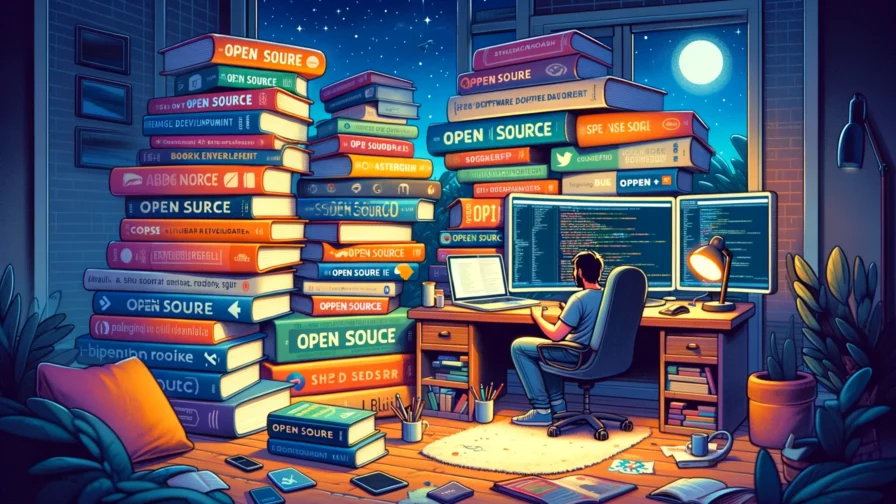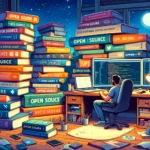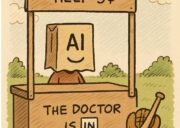
Much like in a Biblical event, the fact that software, born from the rib of hardware, shone with a life of its own has generated new ways of looking at code and its ownership. While in the 70s, large processing systems were one with their software, this was no longer true after the establishment of the Commission on New Technological Uses of Copyrighted Works (CONTU) in 1974, which decreed that software code was a category of intellectual work and as such protected by copyright. Since then, various events have led to the open source movement, which, in simple terms, rejects the logic of the “closed box” by trying to ensure that code can be modified at will by the end user. But if we don’t want to stop at a hasty declaration and want to better understand the open source phenomenon, the following books are, in our opinion, essential to shed light on a phenomenon that is far from having exhausted its path and influence.
Free as in Freedom – Sam Williams
For those involved in software, Stallman’s ideas hold the same value as the Declaration of Independence or the Magna Carta. Controversies have not undermined their freshness and immediacy, although it is somewhat harder to contextualize since the movements that were the basis of his ideas, as well as the ‘heroes’ Stallman refers to, are distant and lost in a narrative that has now reached mythological characters. However, it is always fascinating to rediscover how the idea that “the source code of any program represents a common good and protecting it with patents and copyright should be considered a ‘crime against humanity'” has taken root so radically, leading to a change in vision by multibillion-dollar societies.
The Cathedral and the Bazaar: Musings on Linux and Open Source by an Accidental Revolutionary – Eric S. Raymond
This book offers a deep analysis of the open source development model, examining the differences between the “cathedral” (traditional development models) and “bazaar” (distributed open source development) approaches. It provides a historical and philosophical overview of open source, illustrating how this approach emerged and evolved within the developer community. Through case studies and practical examples, the book analyzes successful open source projects, highlighting the components that have led to their market success. It also delves into the culture of collaboration in the open source world, showing how the distribution of work and the involvement of an extended community can lead to innovative results and explains the motivations of open source developers, describing why many people choose to voluntarily contribute to projects without direct economic return.
Just for Fun: The Story of an Accidental Revolutionary – Linus Torvalds
The subtitle, which reads “I created Linux (just for fun),” is somewhat misleading, if only because the word fun in Torvalds’ vocabulary should be interpreted with many filters. The book perhaps helps a bit to understand the context and character, even though to frame it better, many testimonies from his admirers should be added, and the legends of his detractors are always quite supported by his public statements. The book is still quite enjoyable and faithfully evokes the pioneering spirit of the early days of Linux.
The Success of Open Source – Steven Weber
Intellectual property law has allowed companies to control knowledge and has guaranteed the rights of the innovator. As a result, engineers developing software are widely rewarded; however, as Weber shows, despite old economic axioms that innovation is driven by the promise of individual and corporate wealth, ensuring the free distribution of code among programmers favors a more effective process for creating intellectual products. In the Open Source model, independent programmers contribute for free to software that develops organically, through trial and error, creating widespread wealth on an unimaginable scale according to classic standards.

Working in Public: The Making and Maintenance of Open Source Software – Nadia Eghbal
In “Working in Public,” Nadia Eghbal provides an in-depth look at the modern development of open source software, its evolution, and its implications. By interviewing hundreds of developers to enhance their experience on GitHub, she argues that modern open source offers a model through which to understand the upcoming challenges facing the world of software and beyond. Supporting her thesis, she provides an overview of various open source projects, particularly analyzing:
- The GitHub platform for hosting and development
- The structures, roles, incentives, and relationships involved in open source projects
- The often-neglected maintenance
- The enduring production costs throughout an application’s life.
Eghbal also examines the role of platforms like Twitter, Facebook, Twitch, YouTube, and Instagram, which reduce infrastructure and distribution costs but significantly increase the scope of interactions.
The fact is that open source communities are increasingly centered on the work of individual developers rather than teams. The question that arises is that if creators, rather than discrete communities, will become the epicenter of our online social systems, we need to better understand how they work, and we can do so by studying what has happened with open source.




